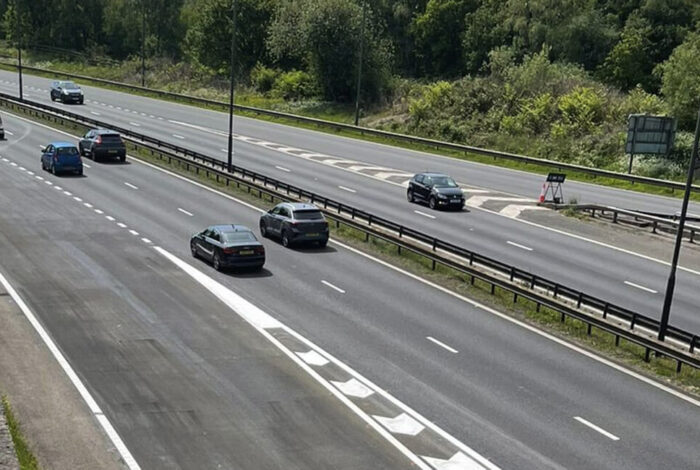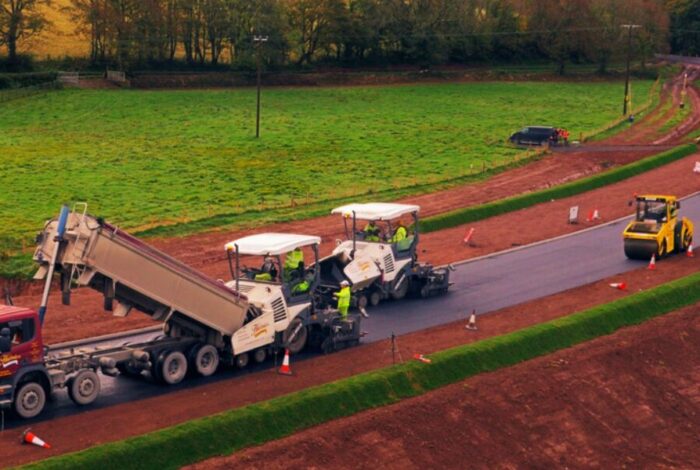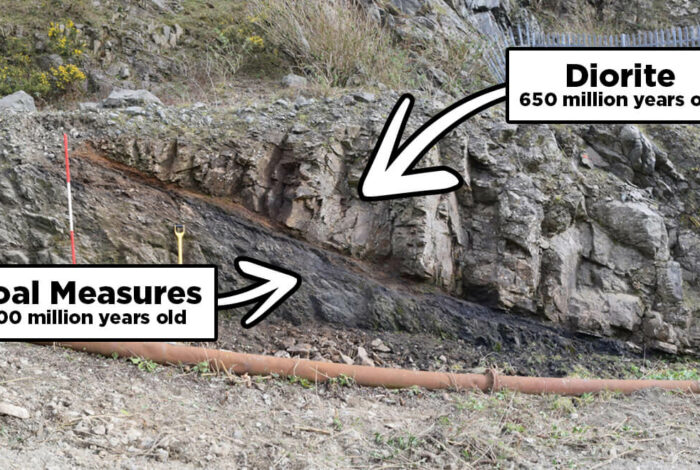From roads to runways – understanding the versatility and benefits of Asphalt
Posted on: March 10th 2024 • Posted in: Asphalt, Uncategorised
We take it for granted when we drive, walk or cycle our local streets, and our children often play on it. Asphalt is often in the background of our daily lives – so, it’s far from boring, and it’s hugely important! Asphalt is one of the most versatile and ubiquitous construction materials in the world. Chances are that you’ve walked on it, driven on it or taken off from it at an airport without realising what an important construction material it is.
Renowned primarily as the go-to material for road construction, asphalt boasts a plethora of applications beyond just pavement. Its durability, sustainability, and flexibility make it a favourite choice across various industries.
In this guide, we’ll delve into everything you need to know about asphalt, uncovering its many uses, advantages, and fascinating properties, with a key focus on asphalt (and roads!) in Wales.
What is asphalt?
Asphalt is a mixture of aggregates, binders (bitumen) and fillers, and is commonly used for roads, pavements, bicycle lanes and sports areas. At GD Harries, the aggregates we use come from our own quarries and are a mixture of crushed stone, gravel and sand.
Bitumen is used as a binder to hold all the materials together. Bitumen is a sticky, black, highly viscous liquid or semi-solid form of petroleum.
What is asphalt used for?
Asphalt is primarily used for road construction, but it also has various other applications, including car parks, pavements, driveways, runways, and recreational surfaces like tennis courts and playgrounds, It’s incredibly versatile.
Asphalt is used in 96% of all roads in the UK. Different types of asphalt are used to construct a road and can be broken down as follows:
- The surface course, the uppermost layer, spans approximately 25-50mm in thickness. This layer serves as a seamless, skid-resistant, and water-resistant surface, ensuring safe and smooth travel.
- Next in line is the binder course, boasting a thickness of around 50-90mm. This sturdy layer bears the weight of traffic, effectively distributing it across the road’s surface and into the base course. Additionally, it functions as a levelling agent, ensuring the pavement’s uniformity.
- Finally, we have the base course, resting on top of a sub-base, offering essential load-bearing support for the road. As you go down through the layers from the surface to the base, the aggregate size typically increases while the bitumen content decreases, contributing to the road’s strength and stability.
In South Wales, GD Harries supplies asphalt to utility companies, local Government, and construction projects for all sorts of uses. They civil engineering division also undertakes major road resurfacing projects have been awarded contracts under the South Wales Trunk Road Agent framework (SWTRA) as well as the Civil and Engineering and Surfacing framework for North and Mid Wales Trunk Road Agent (NMWTRA).
Why do we use asphalt for road construction?
Asphalt is a preferred material for road construction due to its numerous benefits. Its flexibility allows it to withstand heavy traffic loads and varying weather conditions without cracking or breaking, ensuring long-lasting durability. Its smooth surface provides excellent skid resistance and reduces road noise, contributing to safer driving conditions and a more pleasant environment. Asphalt is relatively quick and cost-effective to install, minimising disruption to traffic and surrounding areas during construction. Lastly, asphalt is a sustainable option as it can be recycled and reused, reducing the need for virgin materials and lowering its environmental impact.
What are the different types of asphalt?
There are several types of asphalt, including hot mix asphalt (HMA), warm mix asphalt (WMA), and cold mix asphalt (CMA). Each type has different production methods and performance characteristics. Read more about the different types of asphalt on our South Wales asphalt supplier page where we describe each type in more detail.
Is tarmac the same as asphalt?
While tarmac is often used as a colloquial term for asphalt, it is a different product. Tarmac (short for tarmacadum) was manufactured using tar and aggregates but hasn’t been used for roads for over 35 years as it subsequently considered a hazardous material
What are the benefits of asphalt?
Asphalt offers numerous benefits, including durability, flexibility, smoothness, noise reduction, skid resistance, quick installation, and cost-effectiveness. It also provides excellent water drainage and can be recycled, making it an environmentally friendly choice.
Can asphalt be recycled?
Yes, asphalt is highly recyclable. Old asphalt pavement or other surfaces can be crushed and reused as aggregate in new asphalt mixtures, reducing the need for virgin materials and conserving resources. Recycling asphalt also helps reduce landfill waste and lowers construction costs. Asphalt recycling is a real success story of the construction industry.
How is asphalt produced?
Asphalt is typically produced through a process called hot mix asphalt (HMA) production. It involves heating aggregate materials, such as sand, gravel, and crushed stone, to high temperatures in a rotating drum. At the same time, liquid asphalt binder, derived from crude oil, is heated to a precise temperature and then mixed with the heated aggregates. This mixture is then transported to sites, where it is spread and compacted to form roads, car parks, or other hard surfaces. Additionally, there are alternative methods such as warm mix asphalt (WMA) and cold mix asphalt (CMA), which involve different production techniques and temperatures to achieve similar results in asphalt production.
GD Harries – suppliers of asphalt in South Wales
We currently have three asphalt plants in Altgoch (Cwrtnewydd), Blaencilgoed (Ludchurch) and Bolton Hill near Haverfordwest. In March 2024 we open a fourth plant in Llandarcy near Swansea which is conveniently located just off junction 43 of the M4. This plant will supply asphalt to the Swansea, Port Talbot and Bridgend areas.



